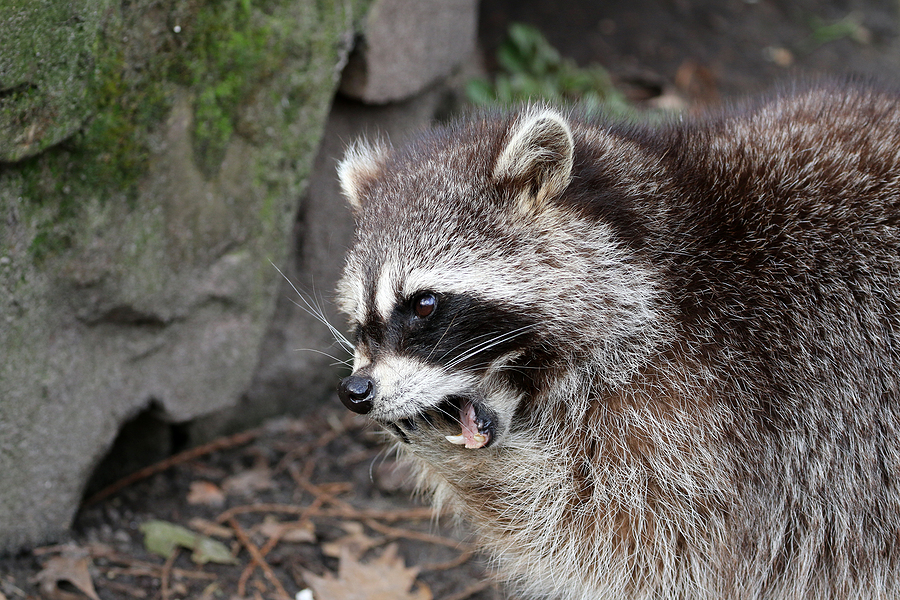Raccoons are a common sight in many neighborhoods, often admired for their cleverness and distinctive masked faces. While they can seem charming, it’s important to remember they are wild animals and can pose a significant health risk, primarily through the transmission of rabies. Understanding the connection between raccoons and this serious disease is crucial for keeping your family and pets safe.
This post will explore what rabies is, why raccoons are frequent carriers, and how you can identify a potentially rabid animal. We will also cover essential safety measures, local statistics for Virginia, and when it’s necessary to call for professional help. Arming yourself with this knowledge helps you coexist safely with local wildlife.

Understanding the Rabies Virus
Rabies is a viral disease that affects the central nervous system of mammals, including humans. The virus is almost always fatal once clinical symptoms appear. It is typically transmitted through the saliva of an infected animal, most commonly through a bite. The virus travels from the point of entry along the nerves to the brain, where it multiplies and causes severe inflammation.
Once the virus reaches the brain, symptoms begin to develop. These can include fever, headache, and general weakness. As the disease progresses, more specific symptoms appear, such as insomnia, anxiety, confusion, paralysis, and hallucinations.
Eventually, it leads to death. There is no effective treatment for rabies once symptoms begin, which is why post-exposure prophylaxis (PEP)—a series of shots administered after a potential exposure—is so critical.
Why Raccoons Are Common Rabies Carriers
Raccoons are considered a primary “vector” species for rabies in the United States, particularly along the East Coast. Several factors contribute to their role in spreading the disease:
- High Population Density: Raccoons thrive in a variety of environments, from forests to dense urban areas. Their adaptability allows their populations to grow, increasing the chances of disease transmission among them.
- Social Behavior: While often seen alone, raccoons can congregate in shared dens or at food sources. This close contact facilitates the spread of the virus from one animal to another through bites or scratches.
- Territorial Disputes: Raccoons, especially males, can be territorial and aggressive. Fights over mates, food, or territory often result in bites, which is the primary mode of rabies transmission.
In Virginia, raccoons are the most frequently reported rabid animal. According to the Virginia Department of Health, they account for a significant portion of all animal rabies cases each year, making public awareness and caution essential.
How to Identify a Rabid Raccoon
A healthy raccoon is typically nocturnal, naturally wary of humans, and moves with purpose. A rabid raccoon, however, will display noticeable and unusual behaviors. Recognizing these signs can help you identify a potential threat and take appropriate action.
Behavioral Signs
- Abnormal Activity: A raccoon seen wandering aimlessly during the daytime may be a sign of illness. While not always indicative of rabies (a nursing mother might forage during the day), it is a significant warning sign when combined with other symptoms.
- Unprovoked Aggression: A rabid animal may lose its natural fear of humans and other animals. It might act aggressively, attempting to attack people, pets, or even inanimate objects without any provocation.
- Disorientation: The raccoon may appear confused, staggering, or unable to move correctly. It might seem “drunk” or partially paralyzed, often in the hind legs.
- Strange Noises: Infected raccoons may make unusual vocalizations, from high-pitched hissing to clicking or chattering sounds.
Physical Signs
- Foaming at the Mouth: This classic rabies symptom is caused by paralysis of the throat muscles, which makes swallowing difficult and leads to an accumulation of saliva.
- Matted or Wet Fur: A sick raccoon may have wet or matted fur on its face and neck due to excessive drooling.
- Self-Mutilation: In some cases, the animal may bite or scratch at the original site of the bite, causing significant injury to itself.
If you observe a raccoon exhibiting any of these signs, do not approach it. Keep a safe distance and contact your local animal control or health department immediately.
Book a Free Raccoon Control Inspection in Richmond ✏
Prevention and Safety Measures
The best way to protect yourself and your pets from rabies is to avoid contact with wild animals, especially raccoons. Here are some practical steps you can take:
- Secure Your Property: Ensure garbage cans have tight-fitting lids, and do not leave pet food or water outside overnight. These are easy food sources that attract raccoons and other wildlife.
- Seal Entry Points: Inspect your home for any potential entry points, such as uncapped chimneys, loose siding, or openings in the attic or foundation. Sealing these access points can prevent raccoons from nesting on your property.
- Vaccinate Your Pets: Keep rabies vaccinations for your dogs, cats, and even ferrets up to date. This is not only a legal requirement in many areas but also a critical barrier to the spread of the disease.
- Educate Your Children: Teach children to never approach or touch wild animals, even if they appear friendly or sick.
- Keep Your Distance: If you encounter a raccoon, maintain a safe distance and do not attempt to feed or interact with it.
What to Do if Bitten By a Raccoon
If you or your pet are bitten or scratched by a raccoon, it is a medical emergency.
Wash the Wound Immediately: Vigorously wash the wound with soap and water for at least 15 minutes. This can help reduce the amount of virus at the site of the bite.
- Seek Medical Attention: Contact your doctor or go to the nearest emergency room immediately. They will assess the situation and determine if you need PEP.
- Report the Incident: Report the bite to your local health department. If possible, and without putting yourself at further risk, try to identify the animal so it can be captured and tested for rabies.
When to Call a Professional Wildlife Control Company
While taking preventative measures is important, sometimes a raccoon problem requires professional intervention. If you have raccoons living in your attic, chimney, or under your deck, do not attempt to remove them yourself. A trapped or cornered raccoon can become extremely aggressive, increasing the risk of bites and scratches.
Professional wildlife removal services have the training, equipment, and knowledge to safely and humanely remove raccoons from your property. They can also help you identify and seal entry points to prevent future infestations, ensuring a long-term solution.
Key Points
Raccoons are an integral part of our local ecosystem, but their potential to carry rabies demands respect and caution. By understanding the risks, recognizing the signs of an infected animal, and taking proactive safety measures, you can significantly reduce the likelihood of a dangerous encounter. Protecting your home and vaccinating your pets are your best lines of defense. When in doubt, always prioritize safety and contact a professional for assistance.
Are raccoons creating a problem on your property? For safe and effective raccoon removal in Richmond, Virginia and surrounding areas, contact our team of experts today. We provide professional wildlife control services to protect your home and family.
Related Post: Understanding Rabies in Virginia: Wildlife, Pets, and You








